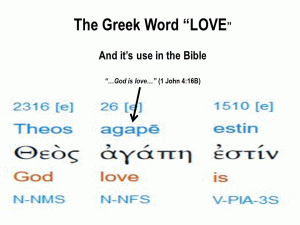Love
If you were to look in a dictionary you might find something like the following for a definition of love:
“An emotion, sentiment, or feeling of pleasurable attraction toward, or delight in something, as a principle, or a person, or a thing, which includes a desire for that somethings presence.”
Love is looked at in our culture as a feeling that comes over a person and makes you feel happy. If you are happy, then you behave nicely. A corollary to this is if you do not feel good you are somehow entitled to behave poorly. All of this is unbiblical because it elevates feelings over obligation, responsibility and commitment.
The New Testament of the Bible was almost entirely transmitted to us via the Koine Greek language which has two major words for love. This makes the Bible more precise about what it is referring to when it uses the word “love.”
PHILEO LOVE
Phileo love denotes an inclination prompted by sense and emotion. It means to love in the sense of being friendly, a delight in, to love to do, or to do with pleasure. Phileo love more nearly represents tender affection. Phileo is never used in a command to men to love God. It is the kind of love from which we get our English word “philanthropy” which is to be kind and to act humanely. It is also the root meaning of the word “philadelphia,” or brotherly love. Since love as an emotion cannot be commanded, phileo will never be used in a command to love. Here are some examples of this kind of love in the Scriptures.
1. John 12:25
2. John 15:19
In both of the verses above, the word “love” is the Greek word “phileo.”
3. 1 Timothy 6:10
In the verse above, the word “love” is the Greek word “philadelphia.”
AGAPE LOVE
The Greek word “agape” is used in the Scriptures to express God’s love to man; man’s love to God; and man’s spiritual love to his fellow men. This love is definitely a “higher form” of love then phileo. This form of love is not an impulse from the feelings and does not always follow the natural inclinations, nor does it spend itself only upon those for whom some affinity is discovered. Agape love seeks the opportunity to do good to all men (Romans 13:8–10).
 Left click your mouse on the image to enlarge it. Hit back arrow to return to document.
Left click your mouse on the image to enlarge it. Hit back arrow to return to document.
4. Matthew 5:44
Agape love is a choice, therefore it can be commanded as Jesus commanded His disciples in the verse above.
5. 1 John 4:8
6. From the verse above, where is it that we find the source and essence of agape love?
7. Matthew 19:19
8. John 13:34
9. John 15:17
10. What do the scriptures in #7, 8 and 9 above tell us about love?
11. Of the two kinds of love explained in this Learning Activity, phileo and agape, which do we see the most in the world and why do you think this is the case?
12. Agape love sounds as if it might be the more difficult of the two kinds of love to express. What two facts do you think make it possible for us to express agape love?
There is a third kind of love that uses the Greek word “storge” but oddly enough the actual Greek word does not appear in the Bible. A second oddity about this word is that even though it is not used in the Bible text there are numerous examples of this kind of love! This form of love is defined as “family love,” or the kind of love that exists between parents and children and other close members of the family unit. Here are some examples from the Bible, but the Greek word “storge” does not appear in the text.
The love of Abraham and Isaac.
Paul’s appeal to Philemon for Onesimus: “I appeal to you for my child, Onesimus, whose father I have become in my imprisonment” (Philemon 10). Onisimus was not Pail’s child but he was appealing by use of this heartfelt love for Onesimus!
The love the man Jairus had for his 12 year old daughter who was dying in Luke 8:40, 42.
A fourth and final Greek word for love is “eros” and it also is not used directly in the Bible but there are multiple examples of it. Eros or erotic love is that which is manifested in romantic, sensual, or sexual love. A prime example in the Scriptures without using the Greek word of “eros” is the account in 1 Samuel 11:2-5 where David, Bathsheba, and her husband Uriah were involved, but the entire story does go all the way through to verse 27 of that chapter. It was a horrible account which God stated that, “the thing that David had done displeased the Lord.”
Click on Self-Check below to check your understanding.